We need to talk about the far-right: spoiler alert - it's not big and its not clever
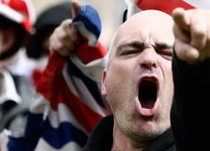
TetleysTLDR: The summary
Put simply, the far right is Not as big as it looks: it is loud, funded, and constantly platformed by the media, but its real base is small. Reform UK’s 'success' is mostly smoke and mirrors: lots of votes under FPTP but little depth, and most of their voters can’t name a single policy beyond 'stop the boats'. When people are told Reform’s actual policies (leave the ECHR, NHS privatisation via vouchers, scrapping Net Zero, slashing workers’ rights), they’re often shocked. Support is built on vibes and scapegoats, not substance.
Behind Reform lurk harder, openly fascist forces: Britain First, Patriotic Alternative Homeland, Tommy Robinson, UKIP.
The far right in Britain isn’t a tidal wave, it’s a circus with very rich ringmasters. Small numbers, big noise, dangerous tactics. Their 'movement' collapses when confronted with facts, consistent policing, and a politics that actually fixes the issues they exploit.
TetleysTLDR: The article
Loud, funded and over-platformed: Britain’s far right looks bigger than it is
If you live online you could be forgiven for thinking Britain fallen to the fascists. Flags draped from lampposts, clenched-jaw Telegram channels pumping out 'intel', furious protests outside hotels, and a nightly procession of 'common sense' culture-war talking points on TV. But volume isn’t volume of support. The far right is loud, funded and over-platformed and still much smaller than its echo chamber wants you to believe.
That doesn’t mean it’s harmless. A minority can still intimidate, injure and distort the national conversation. It has. Yet when you strip away the smoke and mirrors you find a brittle coalition of grievance entrepreneurs, rebranded cranks and a handful of groups with National Front (NF) and neo-Nazi pedigrees trying to surf a broader wave of disillusionment. They’re banking on the rest of us mistaking noise for numbers.
The illusion of momentum
Start with the ballot box. Reform UK’s 2024 general election haul was platformed as an example of 'success': viral clips from declarations, breathless graphics, and five MPs declaring a new era. In reality, Reform took 14.3% of the vote but just five seats, because support was thinly spread and first-past-the-post (FPTP) punishes that pattern. It was historically disproportionate, a real quirk of the system, but it was not a popular mandate for Farageism. House of Commons Library Wikipedia
Meanwhile, much of the street-level 'momentum' in 2024 wasn’t electoral at all but a spasm of organised disorder sparked by online lies. After the Southport stabbings, disinformation claiming the suspect was an asylum seeker lit the fuse for Britain’s worst far-right unrest in years: hotels and mosques targeted, police assaulted, city centres trashed. Hundreds were arrested at the time; by the autumn and into 2025 the cumulative arrest and charge totals ran to four figures as police worked through footage. The 'movement' was real enough to injure over a hundred officers, but it was also fuelled by fantasy and opportunism. TIME Al Jazeera Sky News Wikipedia
Who's actually on the Streets?
Scratch the surface of these protests and you find a familiar cast list.
- Tommy Robinson (Stephen Yaxley-Lennon), the EDL’s co-founder, remains a lightning rod, his rap-sheet as long as his livestreams. He’s been central to the counter-jihad scene for over a decade and repeatedly convicted, including for contempt of court in 2019. His brand is confrontation; his networks are a bridge between older hooligan-style mobilisation and today’s influencer-led flash riots. Wikipedia The Guardian
- Patriotic Alternative (PA), a white-nationalist outfit led by Mark Collett, turns up like iron filings to a magnet whenever asylum accommodation is in the headlines. PA cadres leafletted towns with 'white genocide' propaganda, and PA/hard-right splinters helped amplify the 2024 hotel disturbances. Even after a split that birthed Homeland, the ecosystem’s tactics are the same: provoke, film, fundraise, repeat. Institute of Race Relations
- For Britain, the now-defunct and still semi-operational anti-Muslim party spearheaded by Paul Golding and Jayna Fransen, served as a way-station for activists from the BNP, National Action and EDL circles. It officially folded in 2022, but the pipeline it represented, from UKIP-adjacent politics to street extremism, remains instructive. Founder, Ann-Marie Waters co-launched Pegida UK with Robinson years earlier; the overlap was the point. Wikipedia Hope Not Hate
- The National Front/Britain First milieu hasn’t vanished either. Britain First figures were visible around last summer’s flag stunts and hotel protests; even if organisational badges are downplayed, personnel and aesthetics are unmistakable. When you see a St George’s Cross festooned alongside talk of 'invasion', you’re seeing a lineage. The Times Wikipedia
- The recent Operation 'Raise the Colours' where flags have been raised around the country is organised by the usual suspects, Tommy Robinson and Andy Saxon and Paul Golding. Hope Not Hate
- UKIP: Under Nick Tenconi, A shadow of it's former self, has taken a journey from Euro pressure group into the NAZI fringes of the far right. MSN You tube showing Nazi salute
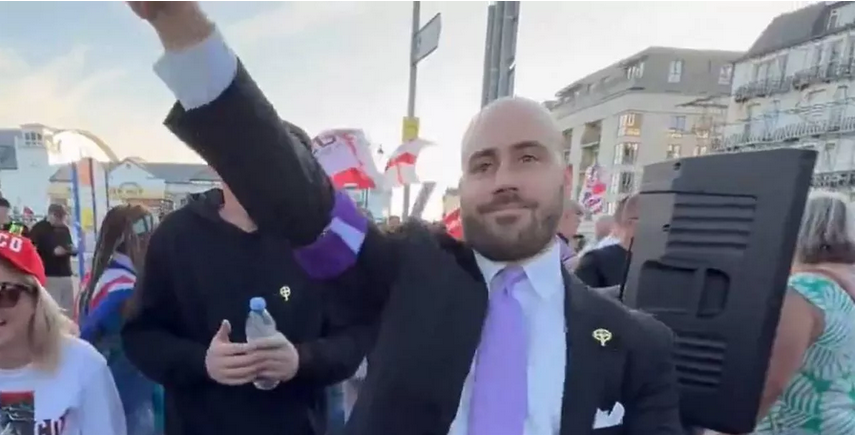
It’s important not to let the re-branders sanitise the story. For example Patriotic Alternative’s ideology isn’t 'patriotic'; it’s explicitly white nationalist, with a documented history of Holocaust denial among supporters and open admiration for Putin’s authoritarianism. The group has tried to embed itself around asylum accommodation for years, and splinter outfits have done the same. Recent investigations in Wales suggest attempts to create racially exclusive 'settlements', a tired import from white-supremacist lore. This is not mainstream populism, it’s extremist entryism looking for cover. The Guardian
And when violence flares, as it inevitably does, these networks are never far away. The 2024 disorder saw hooligan firms, Britain First die-hards and EDL nostalgists mixing with newer 'Active Club' style gym-bro neo-Nazis. It wasn’t mass; it didn’t have majority support; it was still ugly, dangerous and traumatic for the communities on the receiving end. Wikipedia
The pattern is consistent: micro-groups with small memberships punch above their weight by piggy-backing on local grievances (hotels, planning decisions, a crime), then reframing them as national 'rebellions'. The heavy lifting is done online, meme farms and Telegram hubs, and the 'offline' action is tactical spectacle.
When you see a news article outside a far right protest outside a hotel housing immigrants being platformed on the news you should see it for what it is. When they invariably interview a women who claims she is not far-right, just a concerned mother this needs to be unpacked. She may genuinely think she isn't far right but the participation in such a march firmly puts her there. She may very well be a concerned mother but ask who made her concerned and whipped up the moral panic that got her there is the first place. What we are seeing here is a textbook example of manipulation of the politically illiterate. Critical thinking is the enemy of hate but hate gets shoe leather at these protests. It's what the far right do.
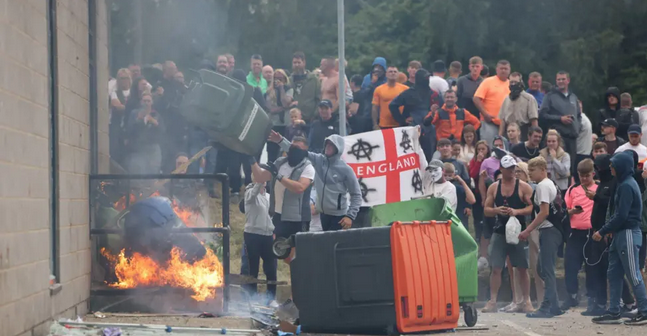
Then there's the illiterate rants on social media. The Gammon spelling disasters online aren’t just a joke, they’re the end product of a deliberate political project. For forty years, elites in Westminster have gutted education, closed youth clubs, shut down libraries, and funnelled entire towns into call centres and zero-hours contracts. The result is a generation left without the tools to question the system choking them, but pumped full of tabloid rage from the likes of the Sun, Telegraph and Daily Mail about 'woke'. And who benefits? Not the working-class lad in Doncaster shouting about 'commys' on Facebook, but the very same hedge fund donors, property developers, and asset-strippers who bankroll Reform UK and whisper in Tory ears. Rupert Murdoch, Lord Rothermere, and their ilk don’t care if their readers can’t spell, they’d prefer it that way. An educated population might notice who’s really robbing them blind. So when you see a post about 'are jobs bin stolen' or wanting 'are cuntry back', what you’re really looking at is someone robbed of a decent school, handed a diet of scapegoats, and told to spit their anger sideways instead of upwards. Their misspellings are the fingerprints of class war: a war in which the ruling class has sabotaged education, stripped dignity from labour, and then sat back to watch as people turn on each other instead of the bastards at the top. Mock the typos if you like, but never forget, the real illiteracy here isn’t just bad spelling, it’s a country that can’t even spell justice.
Why Reform's 'success' is smoke and mirrors
Reform’s electoral trick has been to bottle ambient fury 'send a message' politics, while keeping policy specifics blurry. In focus groups and voxpops you’ll hear Reform voters talk about 'someone finally telling the truth'… and then stall when asked about the programme. That vagueness isn’t an accident. Studies of the party’s would-be voters repeatedly find the motivations are emotional first (betrayal, anger, hopelessness), ideological second and often contradictory on the details. Best for Britain The Times
But the details do exist, and when you lay them out people are often startled. In its 2024 'Contract', Reform promised to leave the European Convention on Human Rights (ECHR); to freeze 'non-essential' immigration; to scrap Net Zero; and to reshape policing and equality law ('common sense policing', scrapping DEI roles, replacing parts of the Equality Act). On health, they floated vouchers for private GP appointments if you can’t be seen within three days, while contradicting their own message of US style insurance based healthcare, insisting care would remain free at the point of use. That’s not a secret plan, it’s in the document and coverage by health press, it’s just rarely discussed in those viral man-in-the-pub clips. Pulse Today
If you find Reform supporters 'quite shocked”' when they hear those planks, it’s because much of the campaign has lived at the level of vibes and villains and the contract was never read or understood. Add in FPTP’s perversities (millions of votes, a handful of MPs) and you’ve got a party that looks bigger than it is, perfect for a politics of perpetual grievance. House of Commons Library
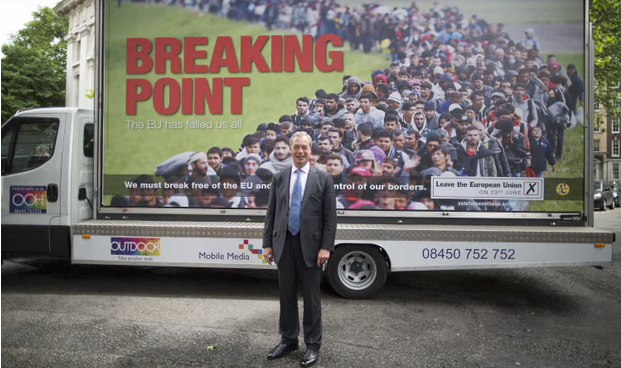
Over-platformed and not just online
The British far right’s other unfair advantage is broadcast oxygen. GB News turned politician-presenters into a format; Ofcom’s decisions around those shows, and subsequent court wrangles, created a now-familiar cycle: push boundaries, bank the clicks, claim persecution. In 2024 Ofcom even confirmed Nigel Farage could keep presenting during the general election campaign (subject to impartiality rules). The regulator later fined the channel over impartiality breaches; in 2025 a High Court judgment complicated parts of Ofcom’s enforcement. The headline for viewers, though, is simple: there’s a nightly megaphone for an agenda whose electoral ceiling is still low. The Guardian Ofcom Courts and Tribunals Judiciary The Independent
Offline, amplification has a physical dimension. When councils and police are left to pick up the pieces of national asylum dysfunction, very online agitators can descend, claim 'the people have spoken', and cash in on donations. That model is fragile, it needs constant outrage to pay, but it thrives when mainstream debate treats bad-faith slogans as serious policy offers. Financial Times The Guardian
Two kinds of protest: two kinds of policing
It's not gone un-noticed on the ground that with the exception of the Southport riots, which were national, far right protests such as the violent hotel protests have relatively few arrests considering what has happened there. Contrast that with the mass arrests of peaceful anti-genocide protestors, including pensioners and people literally sitting on the ground with a placard, arrested under S13 of the Terrorism Act. Here's what the public record shows:
- In the 2024 far-right unrest, police made substantial numbers of arrests during and after events, well over a hundred in single nights in some cities, and more than a thousand cumulatively as forces sifted footage and identified suspects. So the claim that there were 'minimal arrests' overall isn’t quite right. However, policing styles did vary: at hotel stand-offs and flash-mobs there were multiple instances of small numbers of arrests on the day and heavier use of post-event identification, a pattern that can look like leniency in the moment. The Guardian TIME
- By contrast, pro-Palestine mobilisations through late 2023 and early 2024 were, for the most part, remarkably peaceful given their size; the Met recorded 289 arrests across the first months, with just nine arrests at a huge January 2024 march. But in summer 2025 after the government proscribed Palestine Action, the police made hundreds of arrests in a single day at Parliament Square, overwhelmingly for Section 13 'support for a proscribed organisation' offences, many of those arrested being older people participating in a sit-down protest and holding signs. Rights groups have criticised the use of new protest powers (from the 2022 Act and Public Order Act 2023) as chilling and over-broad; the Court of Appeal struck down one set of ministerial regulations extending protest restrictions this May. Parliament Publications The Guardian Liberty
This isn’t to pretend the two contexts are identical, they’re not. Violence demands intervention. But there is a legitimate public debate about consistency and proportionality. Netpol’s 2024/25 analyses argue policing has been skewed by political pressure and 'image management', with protest-control powers increasingly used pre-emptively or for administrative convenience. The perception of 'two-tier policing' is corrosive, and police leaders ought to confront it with data, transparency and a willingness to adjust tactics. Netpol
However, the elephant in the room cannot be ignored: the police, by definition, have always stood closer to the far right than to protesters on the left. Their role is to protect property, hierarchy, and the status quo, which puts them instinctively in line with reactionary forces rather than those challenging power. Time and again we see it, far-right rallies met with polite escorts while climate activists, trade unionists, or pro-Palestine marchers are kettled, surveilled, and arrested. This isn’t about a few 'bad apples'; it’s structural. Policing in Britain, as elsewhere, grew out of keeping the poor in their place and crushing dissent. Expecting them to treat left-wing protest on equal footing is like expecting a guard dog to bite its master.

So how big is the far-Right really?
When you strip out the algorithmic fog, three things remain true.
Firstly, the far right is a minority acting like a majority. In votes and in membership terms, it’s small. Its reach comes from a permissive media ecosystem, a crisis-ridden asylum system that provides constant 'content', and mainstream politicians who think they can placate the tide by imitating its slogans. That’s a mistake: it legitimises the frame without draining its energy. House of Commons Library
Secondly, the danger is nonetheless real. A small, determined cadre can do enormous harm: to refugees housed in hotels, to random Muslims leaving mosques, to officers trying to keep a line. The 2024 riots were not a mirage. Nor is the spread of white-nationalist micro-organisations and 'settlement' fantasies a harmless hobby. This is why patient, boring institutional work, from local prevention and de-radicalisation to faster, fairer asylum decisions matters more than reactive theatre. TIME Wikipedia The Guardian
Thirdly, Reform’s balloon is filled with hot air. When those with any semblance of political literacy hear the whole package: ECHR exit, scrapping Net Zero, 'migrant tax, cultural-grievance bills, NHS as a US style insurance based system, enthusiasm often cools. The party’s coalition contains plenty of voters who still want a welfare state, the NHS and basic fairness. That’s why competence on bread-and-butter issues remains its Achilles’ heel and why opponents shouldn’t cede the ground of 'security' or 'order' to a programme that mostly offers scapegoats. Reform Contract 2024 Pulse Today The Times
What to do about it?
There’s no single silver bullet, but there are obvious steps.
- Stop feeding the spectacle. Don’t book chaos-merchants just because they rate. If you must host them, pin them to specifics. “Which page of your manifesto commits to leaving the ECHR?” “How much do your police and prison pledges cost, and where’s the money coming from?” The oxygen of attention doesn’t have to come with the laxity of kid-gloves. Reform contract 2024
- Fix what’s fixable. Far-right opportunists cluster where the state is failing: asylum accommodation, court backlogs, NHS waits. When government sets out a clean plan to accelerate asylum appeals and end hotel use, and then actually delivers, the riots lose a recruitment pitch. When the NHS can see you this week, the private-voucher sales patter lands worse. Financial Times
- Enforce laws consistently, transparently. Publish clear arrest/charge data per protest type; explain rationales for on-the-day versus retrospective arrests; apply equal thresholds to violent conduct and to non-violent civil disobedience. And keep Public Order powers within constitutional guardrails. The Courts are already reining back overreach. Liberty
- Name the nasties. Don’t let 'patriot' branding launder white nationalism. Councils, clubs and community groups can adopt simple due-diligence rules on who they platform and whose banners they accept. Journalists can call things what they are, using established research rather than laundering euphemisms. The Guardian Hope Not Hate
- Talk to Reform-curious voters like grown-ups. Many are not ideologues: they’re tired. of being bullshitted to and looking for an alternative to our broken political system. Show respect. Show delivery. And show your homework on costs and trade-offs. It’s remarkable how fast 'send them all back' slogans wilt when confronted with actual policy that would, say, strip Britain of the ECHR and its consequences for everyday rights for Reform voters and their families, just like everybody else. Reform Contract 2024
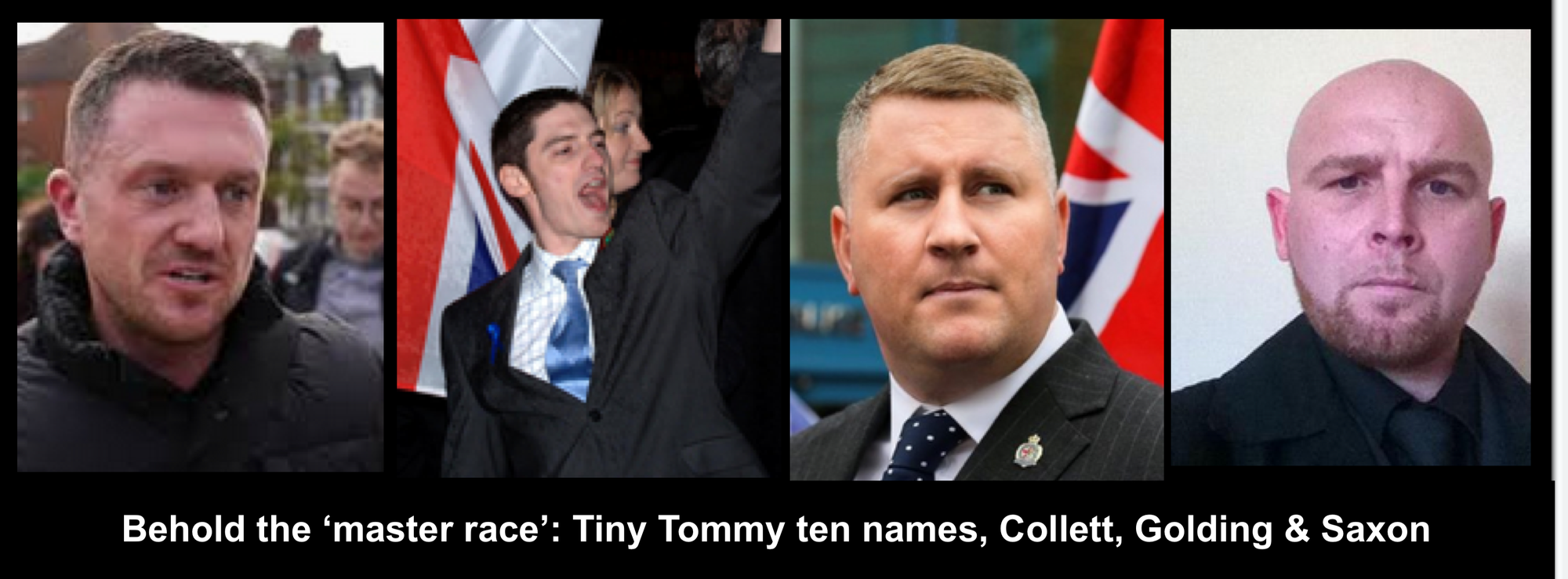
Britain’s far right will keep trying to look bigger than it is. That’s the business model. Our job is to keep it in proportion: serious enough to confront, not so large we talk ourselves into panic or fatalism. Democracies don’t die because a few extremists wave flags outside a Travelodge; they wither when the centre stops defending the boring, patient virtues of equal law, humane policy and institutional competence, and when broadcasters confuse performative anger with democratic argument. The noise can be turned down. The numbers can be won back. And the country we actually are: mixed, stubbornly decent, allergic to bullies is still there when we look past the show.
Sources (selected)
- Reform UK “Contract” (2024) pledges on ECHR exit, immigration freeze, Net Zero, policing/DEI, and NHS waiting list claims; plus private GP 'voucher' coverage in the health press. Reform Contract 24 Pulse Today
- Election outcomes House of Commons Library analysis of 2024 results and disproportionality under FPTP. House of Commons Library+1
- 2024 unrest contemporaneous reporting and totals on arrests, injuries and far-right involvement. TIME Al Jazeera Wikipedia
- Patriotic Alternative/Homeland: profiles and reporting on ideology, tactics and involvement around hotels; plus recent Wales settlement expose. The Guardian Wikipedia
- For Britain/Anne Marie Waters background on ex-BNP/National Action/EDL overlap and party dissolution. Hope Not Hate Wikipedia
- Protest policing Met/Parliamentary data on pro-Palestine marches; mass arrests post-proscription; rights-group analyses of POA 2023; Court of Appeal ruling curbing protest restrictions. Parliament Publications The Guardian Liberty
- Media/platforming Ofcom decisions, fine, and subsequent legal challenge affecting GB News; decision to allow Farage on air during the 2024 campaign. The Guardian Ofcom Courts and Tribunals Judiciary
- Reform-curious voters research showing emotion-led support more than policy literacy. Best for Britain The Times
A bit of shameless self-plugging here. This is www.TetleysTLDR.com blog. It's not monetised. Please feel free to go and look at the previous blogs on the website and if you like them, please feel free to share them.

TetleysTLDR:
